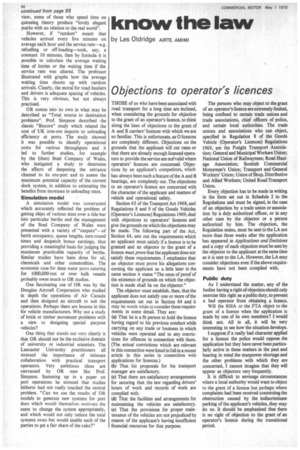know the law
Page 98

If you've noticed an error in this article please click here to report it so we can fix it.
by Les Oldridge AIRTE. AMIMI
Objections to operator's licences
THOSE of us who have been associated with road transport for a long time are inclined, when considering the grounds for objection to the grant of an operator's licence, to think along the lines of objections to the grant of A and B carriers' licences with which we are so familiar. This is unfortunate, as 0 licences are completely different. Objections on the grounds that the applicant will cut rates or that there are already enough licensed operators to provide the service are notvalid where operators' licences are concerned. Objections by an applicant's competitors, which has always been such a feature of the A and B hearings, are completely out. The objections to an operator's licence are concerned with the character of the applicant and matters of vehicle and operational safety.
Section 63 of the Transport Act 1968, and Regulations 8 and 9 of the Goods Vehicles (Operator's Licences) Regulations 1969, deal with objections to operators' licences and give the grounds on which the objections may be made. The following part of the Act, Section 64, sets out the requirements which an applicant must satisfy if a licence is to be granted and an objector to the grant of a licence must prove that the applicant does not satisfy these requirements. I emphasize that an objector must prove his allegations concerning the applicant as a little later in the same section it states "The onus of proof of the existence of grounds on which the objection is made shall lie on the objector."
The objector must establish, then, that the applicant does not satisfy one or more of the requirements set out in Section 64 and it may be worth while to consider these requirements in some detail. They are: (a) That he is a fit person to hold the licence having regard to his previous conduct while carrying on any trade or business in which vehicles were operated and to any convictions for offences in connection with them. (The actual convictions which are relevant in this connection were listed in full in a recent article in this series in connection with applications for licences.) (b) That his proposals for his transport manager are satisfactory.
(c) That there are satisfactory arrangements for securing that the law regarding drivers' hours of work and records of work are complied with.
(d) That the facilities and arrangements for • maintaining the vehicles are satisfactory.
(e) That the provisions for proper main-. tenance of the vehicles are not prejudiced by reason of the applicant's having insufficient financial resources for that purpose. The persons who may object to the grant of an operator's licence are extremely limited, being confined to certain trade unions and trade associations, chief officers of police, and certain local authorities. The trade unions and associations who can object, specified in Regulation 8 of the Goods Vehicle (Operator's Licences) Regulations 1969, are the Freight Transport Association; General and Municipal Workers Union; National Union of Railwaymen; Road Haulage Association; Scottish Commercial Motormen's Union; Transport and 'General Workers' Union; Union of Shop, Distributive and Allied Workers; United Road Transport Union.
Every objection has to be made in writing in the form set out in Schedule 2 to the Regulations and must be signed, in the case of an objection by a trade union or association by a duly authorized officer, or in any other case by the objector or a person authorized by him. The objection, the Regulation states, must be sent to the LA not more than three weeks after the application has appeared in Applications and Decisions and a copy of each objection must be sent by the objector to the applicant at the same time as it is sent to the LA. However, the LA may consider objections even if the above requirements have not been complied with.
Public duty As I understand the matter, any of the bodies having a right of objection should only exercise this right as a public duty, to prevent a bad operator from obtaining a licence.
Will the REA or the FTA object to the grant of a licence when the application is made by one of its own members? I would think not. All in all, it will be very interesting to see how the situation develops.
I suppose if a really bad character applied for a licence the police would oppose the application but they have never been particularly active in these matters in the past and bearing in mind the manpower shortage and the other problems with which they are concerned, I cannot imagine that they will appear as objectors very frequently.
It is difficult to envisage circumstances where a local authority would want to object to the grant of a licence but perhaps where complaints had been received concerning the obstruction caused by the indiscriminate parking of the applicant's vehicles, they may do so. It should be emphasized that there is no right of objection to the grant of an operator's licence during the transitional period.
















































































































































































































